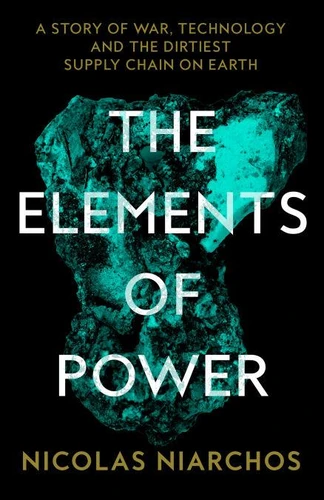The Elements of Power. A Story of War, Breakthrough Technology and the Dirtiest Supply Chain on Earth
Par :Formats :
Actuellement indisponible
Cet article est actuellement indisponible, il ne peut pas être commandé sur notre site pour le moment. Nous vous invitons à vous inscrire à l'alerte disponibilité, vous recevrez un e-mail dès que cet ouvrage sera à nouveau disponible.
Disponible dans votre compte client Decitre ou Furet du Nord dès validation de votre commande. Le format ePub protégé est :
- Compatible avec une lecture sur My Vivlio (smartphone, tablette, ordinateur)
- Compatible avec une lecture sur liseuses Vivlio
- Pour les liseuses autres que Vivlio, vous devez utiliser le logiciel Adobe Digital Edition. Non compatible avec la lecture sur les liseuses Kindle, Remarkable et Sony
- Non compatible avec un achat hors France métropolitaine
 , qui est-ce ?
, qui est-ce ?Notre partenaire de plateforme de lecture numérique où vous retrouverez l'ensemble de vos ebooks gratuitement
Pour en savoir plus sur nos ebooks, consultez notre aide en ligne ici
- Nombre de pages272
- FormatePub
- ISBN978-0-00-855396-8
- EAN9780008553968
- Date de parution29/01/2026
- Protection num.Adobe DRM
- Infos supplémentairesepub
- ÉditeurWilliam Collins
Résumé
How we became addicted to a supply chain that wreaks havoc across the globe
Epic, shocking, and deeply reported, The Elements of Power tells the story of the war for the global supply of battery metals-essential for the decarbonization of our economies-and the terrible, bloody human cost of this badly …
How we became addicted to a supply chain that wreaks havoc across the globe
Epic, shocking, and deeply reported, The Elements of Power tells the story of the war for the global supply of battery metals-essential for the decarbonization of our economies-and the terrible, bloody human cost of this badly misunderstood industry
Congo is rich. Swaths of the war-torn African country lack basic infrastructure, and, after many decades of colonial occupation, its people are officially among the poorest in the world.
But hidden beneath the soil are vast quantities of cobalt, lithium, copper, tin, tantalum, tungsten, and other treasures. Recently, this veritable periodic table of resources has become extremely valuable because these metals are essential for the global "energy transition"-the plan for wealthy nations to wean themselves off fossil fuels by shifting to sustainable forms of energy, such as solar and wind.
The race to electrify the world's economy has begun, and China has a considerable head start. From Indonesia to South America to Central Africa, Beijing has invested in mines and infrastructure for decades. But the U. S. has begun fighting back with massive investments of its own, as well as sanctions and disruptive tariffs. In this rush for green energy, the world has become utterly reliant on resources unearthed far away and willfully blind to the terrible political, environmental, and social consequences of their extraction.
If the Democratic Republic of the Congo possesses such riches, why are its children routinely descending deep into treacherous mines to dig with the most rudimentary of tools, or in some cases their bare hands? Why are Indonesia's seas and skies being polluted in a rush for battery metals? Why is the Western Sahara, a source for phosphates, still being treated like a colony? Who must pay the price for progress? With unparalleled, original reporting, Nicolas Niarchos reveals how the scramble to control these metals and their production is overturning the world order, just as the global race to drill for oil shaped the twentieth century.
Exploring the advent of the lithium-ion battery and tracing the supply chain for its production, Niarchos tells the story both of the people driving these tectonic changes and those whose lives are being upended. He reveals the true, devastating consequences of our best intentions and helps us prepare for an uncertain future. If you have ever used a smartphone or driven an electric vehicle, you are implicated.
But hidden beneath the soil are vast quantities of cobalt, lithium, copper, tin, tantalum, tungsten, and other treasures. Recently, this veritable periodic table of resources has become extremely valuable because these metals are essential for the global "energy transition"-the plan for wealthy nations to wean themselves off fossil fuels by shifting to sustainable forms of energy, such as solar and wind.
The race to electrify the world's economy has begun, and China has a considerable head start. From Indonesia to South America to Central Africa, Beijing has invested in mines and infrastructure for decades. But the U. S. has begun fighting back with massive investments of its own, as well as sanctions and disruptive tariffs. In this rush for green energy, the world has become utterly reliant on resources unearthed far away and willfully blind to the terrible political, environmental, and social consequences of their extraction.
If the Democratic Republic of the Congo possesses such riches, why are its children routinely descending deep into treacherous mines to dig with the most rudimentary of tools, or in some cases their bare hands? Why are Indonesia's seas and skies being polluted in a rush for battery metals? Why is the Western Sahara, a source for phosphates, still being treated like a colony? Who must pay the price for progress? With unparalleled, original reporting, Nicolas Niarchos reveals how the scramble to control these metals and their production is overturning the world order, just as the global race to drill for oil shaped the twentieth century.
Exploring the advent of the lithium-ion battery and tracing the supply chain for its production, Niarchos tells the story both of the people driving these tectonic changes and those whose lives are being upended. He reveals the true, devastating consequences of our best intentions and helps us prepare for an uncertain future. If you have ever used a smartphone or driven an electric vehicle, you are implicated.



